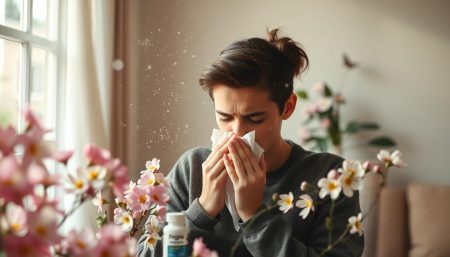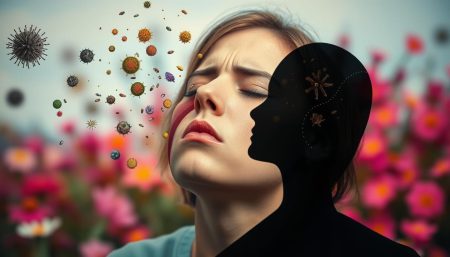For many, spring and fall mean more than just a change in weather. They also bring seasonal allergy symptoms. These symptoms can really get in the way, affecting work and health. This article aims to help you understand and manage allergies, while acknowledging the personal challenges they pose.
Understanding the daily struggles of those with allergies is key. This article aims to make navigating allergy season easier. It covers recognizing symptoms, finding triggers, and when to see a doctor. Our goal is to help you find comfort in the face of pollen.
Key Takeaways
- Recognize the varied seasonal allergy symptoms to better manage your health.
- Insight into understanding allergies can empower individuals to make informed decisions.
- Exploration of preventative strategies plays a vital role in effective allergy management.
- Knowledge is power—comprehending triggers can help minimize exposure to allergens.
- Professional guidance can make a substantial difference for those facing severe symptoms.
Understanding Seasonal Allergies and Their Causes
As the seasons change, many people start sneezing, sniffling, and getting itchy eyes. These symptoms come from pollen allergies, also known as hay fever. It’s caused by the body reacting to airborne allergens. Knowing the causes and how they change with the seasons is key.
What Are Seasonal Allergies?
Seasonal allergies, or hay fever, happen when the immune system reacts to air allergens. These are mostly present at certain times of the year. The Asthma and Allergy Foundation of America says these allergens are usually harmless things like pollen from trees, grasses, and weeds. They cause allergic reactions and uncomfortable symptoms.
Common Triggers of Pollen Allergies
The American Academy of Allergy, Asthma & Immunology lists several pollen allergy triggers. In spring, tree pollen is the main culprit. Summer brings grass pollen, and fall is all about weed pollen. Climate and where you live also affect which pollen is more common in your area.
Peak Allergy Seasons Across Regions
The length and severity of peak allergy season vary by location and climate. The National Center for Biotechnology Information says changes in weather and plant growth cycles affect allergy seasons. For example, warmer weather can make pollen seasons start earlier and last longer, making symptoms worse for longer.
Knowing the causes and triggers of seasonal allergies is crucial for managing them. Understanding how the environment affects pollen helps people prepare for tough allergy seasons. This knowledge lets people take steps to make their lives more comfortable if they have pollen allergies.
Identifying Key Seasonal Allergy Symptoms
Seasonal allergies show up in different ways, making life hard. Knowing these signs helps catch the problem early. It also makes it easier to deal with the symptoms.
Nasal Congestion and Its Effects
Nasal congestion is more than a nuisance. It can really mess with your sleep and breathing. It’s a sign your body is fighting off pollen and other allergens.
The Onset of Itchy, Watery Eyes
Itchy eyes are a big sign of seasonal allergies. They happen when your body reacts to allergens. This can make your eyes water a lot, trying to get rid of the allergens.
Recognizing Sneezing and Wheezing Patterns
Sneezing is another common symptom. It can be mild or very bad. Wheezing might mean your allergies are affecting your lungs, which is serious.
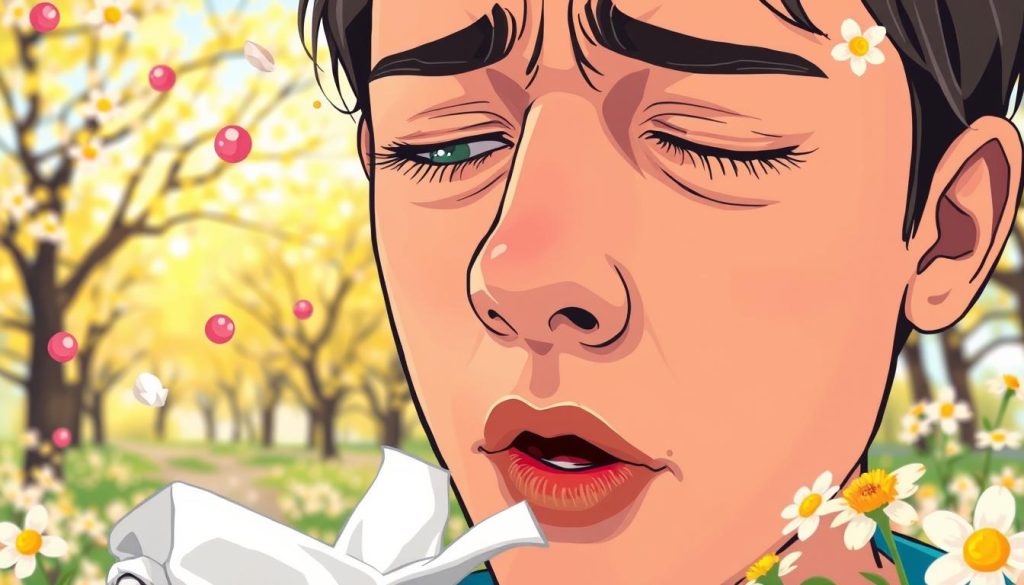
Knowing the signs—nasal congestion, itchy eyes, runny nose, sneezing, and wheezing—is key. It helps you act fast and treat your allergies. This way, you can manage the discomfort and health issues better.
Distinguishing Allergies From Common Colds
Telling if you have a cold or allergies can be tricky. Both can make your nose run and your throat feel stuffy. But knowing the difference, like how long symptoms last and if you have an itchy throat or watery eyes, can help you feel better faster.
One important thing to notice is the type of nasal discharge. Colds usually make your nose produce thick, yellow mucus. Allergies, on the other hand, cause clear, thin discharge. Allergies also make you sneeze a lot and can make your throat and eyes itch without a fever.
- Duration of Symptoms: Colds usually go away in a week. Allergy symptoms can last as long as you’re exposed to allergens.
- Fever: Fevers are rare with allergies but common with colds.
- Time of Year: Colds are more common in winter. Allergies can happen any time of year, especially in spring and fall.
Knowing these differences helps you manage your symptoms better. It also prevents using medicines that might not work. It’s best to keep track of your symptoms and talk to a doctor to find the right treatment for you.
Symptoms In Children Versus Adults
When we look at childhood allergies and adult-onset allergies, we see big differences. These differences are key to managing and treating allergies well.
How Allergy Symptoms Manifest in Children
Children with allergies often face big challenges. They might sneeze a lot, have itchy noses and eyes, and deal with ear problems. These issues can make it hard for them to learn and play with friends.
Adult-Onset Allergies: What to Expect
Adult-onset allergies can surprise people later in life. Adults might feel stuffy, have sinus pressure, and notice changes in taste and smell. They might need to change their lifestyle to cope with these new allergies, which can really affect their life.
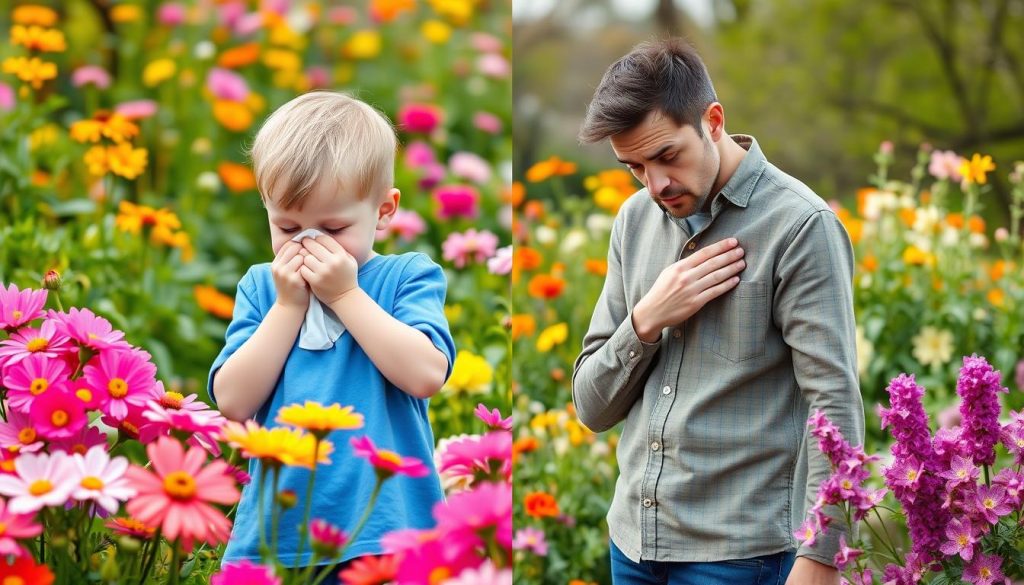
| Aspect | Childhood Allergies | Adult-Onset Allergies |
|---|---|---|
| Common Symptoms | Sneezing, itchy nose/eyes, ear problems | Nasal congestion, sinus pressure, altered senses |
| Impact on Daily Life | Affects school performance and play | Lifestyle changes, impacts work and personal life |
| Treatment Focus | Symptom relief, environmental control | Lifestyle modification, medical intervention |
Knowing these differences helps us use the right treatments. It also helps us understand what to expect when managing allergies at different ages.
The Link Between Seasonal Allergies and Asthma
Seasonal allergies can really affect people with allergic asthma, especially when pollen counts are high. This mix of discomfort and worry needs good allergy management to control asthma symptoms. It helps people live better lives, even with environmental triggers.
Understanding Allergic Asthma
Allergic asthma is caused by the same things that trigger seasonal allergies. When pollens cause airway inflammation, breathing gets hard. Knowing these triggers is key to managing asthma and stopping symptoms early.
Managing Asthma Symptoms During Allergy Season
To handle asthma symptoms well during allergy season, focus on managing allergies. Keep an eye on pollen counts, stay inside when counts are high, and use air purifiers. Also, adjust your medicine when allergy triggers go up. Always do this with a doctor’s help.
| Strategy | Benefit | Implementation |
|---|---|---|
| Air Quality Control | Reduces allergen presence | Use of HEPA filters in homes and workplaces |
| Medication Adjustment | Prevents symptom spike | Consult a healthcare provider to adapt asthma medication |
| Pollen Monitoring | Minimizes exposure | Check daily pollen levels and plan activities accordingly |
By using these specific strategies, people with allergic asthma can manage their condition better during tough times. Keeping up with allergy management is crucial for controlling asthma symptoms. This way, they can enjoy the season more healthily.
How Climate Change Affects Pollen Allergies
The growing effect of climate change on environmental allergens is clear in pollen season. Changes in climate make pollen seasons longer and pollen counts higher. This makes seasonal allergies worse.
Studies show that warmer temperatures and more CO2 mean pollen is around longer. This link between climate change and more severe allergy symptoms is strong. As pollen seasons get longer, more people are exposed to these allergens.
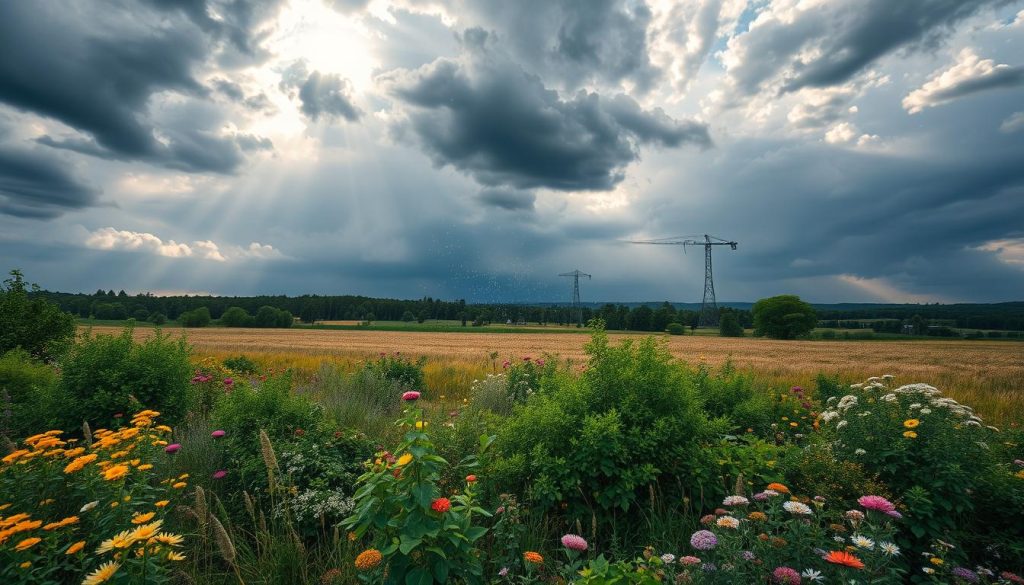
Now, trees, grasses, and weeds produce more pollen than ever. This means we need new ways to deal with the health risks of more allergens.
Let’s look at how climate change is changing pollen seasons and what it means for allergy sufferers:
| Factor | Impact on Pollen Production | Effect on Allergy Sufferers |
|---|---|---|
| Increased CO2 Levels | Enhances pollen production in plants | Higher exposure to allergens, exacerbating symptoms |
| Warmer Temperatures | Extends growing and pollen seasons | Longer seasons increase duration of symptoms |
| Shifts in Plant Distribution | Plants capable of producing allergenic pollen spread to new areas | Expands geographical range of allergy triggers |
As we talk more about climate change, it’s key to understand its link to pollen season and environmental allergens. This connection shows we need to make health strategies more climate-resilient. This is especially true for those with seasonal allergies.
Preventive Measures to Mitigate Seasonal Allergy Symptoms
As the seasons change, so does the level of allergens in the environment. It’s key to use strategies that help reduce allergen exposure and keep us safe outdoors. Following advice from top health groups can really help lessen seasonal allergy effects.
Reducing Exposure to Allergens
The Environmental Protection Agency suggests ways to cut down on indoor allergens. Using air purifiers can greatly improve indoor air quality. Also, keeping windows shut when pollen counts are high stops allergens from getting in, helping to lessen symptoms.
Protective Practices for Outdoor Activities
The National Institute of Environmental Health Sciences advises outdoor activity precautions to shield sensitive people from allergy triggers. Wearing pollen masks and doing outdoor activities after pollen peaks can be key steps in managing allergies.
- Air purifiers to filter out pollen and other allergens inside the home
- Keeping windows closed during peak pollen release times
- Wearing protective masks to limit inhalation of allergens
- Planning outdoor activities when pollen counts are lower
By using these methods, we can enjoy a better life, especially during allergy season. They offer practical ways to reduce allergen exposure and take outdoor activity precautions.
Seasonal Allergy Symptoms: A Deeper Dive
Looking beyond common allergy symptoms, we find important signs like itchy throat and ears. These symptoms can really affect our daily lives. This section will explore these symptoms and how to handle severe allergic reactions.
Detailed Look at Itchy Throat and Ears
An itchy throat often comes from pollen and other allergens irritating the mucus membranes. This can also make your ears itch because of shared nerve pathways. Johns Hopkins Medicine says knowing these symptoms early helps manage them better.
Navigating Severe Allergic Reactions
Severe allergies can be very dangerous and need quick action. Signs include trouble breathing, hives, and swelling. The Annals of Allergy, Asthma & Immunology stress the need for fast treatment, often with epinephrine.
To understand more about seasonal allergies and their symptoms, like itchy throat and critical allergic reactions, it’s key to take preventive steps.
| Symptom | Description | Treatment Options |
|---|---|---|
| Itchy Throat | Discomfort in the throat often accompanied by itching in the ears | Antihistamines, throat lozenges |
| Severe Allergic Reactions | Includes symptoms like swelling, hives, and breathing difficulties | Immediate administration of epinephrine |
Home Remedies for Managing Allergy Symptoms
Many people with seasonal allergies look for natural ways to feel better. They want to avoid taking medicine. Luckily, there are many home remedies that can help.
Using local honey is a common method. It’s believed to help build immunity against local pollen. Herbal teas like peppermint or ginger can also help. They have anti-inflammatory properties that soothe the nose and throat.
- Saline nasal rinses can clear allergens from the nasal membranes, reducing symptoms.
- Steam inhalation is another easy technique to relieve nasal congestion.
- A diet rich in anti-inflammatory foods such as turmeric, omega-3 fatty acids, and leafy vegetables can also support overall immune function.
Keeping indoor air clean is key. Open windows often and use air purifiers to cut down on allergens. Keeping humidity low also stops mold from growing, a common allergen.
Wearing a mask when pollen counts are high is also helpful. It keeps allergens out of your airways. These home remedies offer a natural way to fight seasonal allergy symptoms.
For those looking for natural relief, home remedies are a good choice. They can be part of a broader wellness plan. This approach aims to reduce the need for medicine while still offering relief.
Over-the-Counter Solutions and Medications
Many people use over-the-counter medication to fight seasonal allergies. These include antihistamines, nasal sprays, and eye drops. They help ease symptoms fast and don’t need a doctor’s prescription.
Antihistamines and Their Use
Antihistamines are a common choice for allergy relief. They block histamine, which your body makes during an allergic reaction. This reduces sneezing, itching, and too much mucus. Pharmacy Times lists several over-the-counter options, each with its own effects and how long they last.
Nasal Sprays and Eye Drops
Harvard Medical School says nasal sprays can lessen nasal stuffiness and swelling. Eye drops help with red, itchy, and watery eyes. It’s key to use them as directed to avoid losing their effectiveness or getting side effects.

The table below shows what these medications are for and their benefits:
| Medication Type | Main Use | Common Brands | Notes |
|---|---|---|---|
| Antihistamines | Relief from sneezing, runny nose, and itchiness | Claritin, Zyrtec, Allegra | Non-drowsy options available |
| Nasal Sprays | Reduction of nasal congestion and inflammation | Flonase, Nasacort | May take a few days to reach full effect |
| Eye Drops | Treatment of red, itchy, watery eyes | Visine, Alaway | Instant relief, use as needed |
In summary, over-the-counter antihistamines, nasal sprays, and eye drops offer quick relief for many allergy sufferers. Always think about your health and talk to a doctor before using them. This ensures they’re right for you.
When to Seek Professional Medical Advice
Seasonal allergies can usually be handled with over-the-counter meds and small changes in your routine. But, there are times when you need to see a doctor. Knowing when to get help is important for your health during allergy season.
Signs That Your Allergies Need Medical Attention
If you have constant symptoms like severe nasal stuffiness, trouble breathing, or allergies that get worse, you should see a doctor. The Centers for Disease Control and Prevention say that long-lasting or getting worse allergic reactions can cause serious health problems. This means you need a doctor’s check-up.
Benefits of Allergy Testing and Immunotherapy
Allergy testing is the first step in managing allergies. It finds out which allergens cause your reactions. The Journal of Allergy and Clinical Immunology says that specific allergy testing helps make better treatment plans. These plans might include immunotherapy, which can help manage symptoms for a long time and even stop them altogether.
| Treatment | Description | Expected Benefits |
|---|---|---|
| Allergy Testing | Detects specific allergens responsible for reactions | Enables personalized treatment plans |
| Immunotherapy | Gradual exposure to allergens to build tolerance | Can reduce symptoms and, in some cases, lead to remission |
Knowing when to ask for medical advice can really improve your life during allergy seasons. Allergy testing and immunotherapy are key steps in managing allergies. They can greatly improve your health and daily life.
Lifestyle Adjustments to Alleviate Seasonal Allergies
Making lifestyle changes can greatly improve comfort for those with seasonal allergies. Focusing on diet, exercise, and stress management can help reduce symptoms. These changes can bring noticeable relief from allergy discomfort.
Dietary Considerations for Allergy Sufferers
Research from the American Journal of Clinical Nutrition shows a link between diet and allergy symptoms. Foods like salmon and flaxseeds, rich in omega-3 fatty acids, may reduce inflammation. On the other hand, processed foods and high sugar can worsen symptoms.
- Increase omega-3 intake to help reduce inflammation.
- Avoid processed foods that may heighten sensitivity to allergens.
- Hydrate consistently to thin mucus, making it easier to expel allergens.
The Role of Regular Exercise and Stress Reduction
The Annals of Behavioral Medicine highlights the benefits of exercise and stress management. Regular physical activity and stress control can improve health and reduce allergic reactions. Yoga and moderate exercise can improve blood flow and lessen symptoms.
- Engage in daily exercises such as brisk walking or cycling.
- Adopt mindfulness and relaxation techniques to manage stress levels.
- Consider exercises that can be performed indoors to avoid high pollen levels.

Comparing Seasonal Allergies Around the World
To grasp how global allergy patterns and international allergy prevalence vary, we must look at many factors. These include environment, culture, and genetics. Different places, from forests to cities, have their own types of allergens. This affects people’s lives in big ways.
In places with lots of humidity and plants, pollen counts are often higher. This leads to more allergies. On the other hand, cities face more allergies because of pollution and other pollutants. These differences are key to understanding global allergy patterns.
| Region | Common Allergens | Prevalence Rate |
|---|---|---|
| North America | Pollen, Dust Mites | High |
| Europe | Pollen, Pet Dander | Medium |
| Asia | Pollution, Pollen | Variable |
| Africa | Dust, Pollen | Low to Medium |
| South America | Fungal Spores, Pollen | Medium to High |
The effect of international allergy prevalence goes beyond health. It also impacts the economy and society. High rates can increase healthcare costs and lower work productivity.
Knowing about these global differences is crucial. It helps in creating specific treatments for each area. This knowledge is essential for doctors and researchers to fight allergies worldwide.
In summary, global allergy patterns and international allergy prevalence are influenced by many factors. This shows we need a plan that works for each place but also considers global issues. This approach is vital for managing and easing allergy problems.
The Impact of Allergies on Daily Life and Productivity
Allergies can really slow down our daily lives and work. They are a big health issue that affects more than just our bodies. We need good ways to coping with allergies and to make the air inside better. This will help us feel better and work better too.
Coping Strategies for Work and School
A study in the Journal of Allergy and Clinical Immunology shows that allergies hurt our work and school performance. It’s important to take steps like:
- Keeping places clean and free of dust and allergens.
- Taking breaks during pollen seasons to avoid getting sick.
- Using air filters to catch more allergens in the air.
These steps can help lessen how allergies affect our daily tasks and important work.
Improving Indoor Air Quality for Allergy Relief
Improving indoor air quality is key to fighting allergies and making places healthier. Consumer Reports says:
| Method | Description | Effectiveness |
|---|---|---|
| HEPA Filters | Traps airborne particles such as pollen, dust, and pet dander | High |
| Dehumidifiers | Reduces humidity levels, preventing mold growth | Medium to High |
| Natural Ventilation | Introduces fresh air, reducing indoor pollutant levels | Variable |
Using these methods and products can make our homes and workspaces better for our health. It helps us breathe easier and feel better overall.
Trending Research and Future Treatments in Allergy Care
Allergy care is making big strides thanks to allergy research and medication developments. New treatments are coming, offering hope to millions of people with allergies around the world.
Breakthroughs in Allergy Medication
The New England Journal of Medicine has shared exciting news. New medicines are being developed to target allergies more effectively. These medication developments aim to reduce symptoms and side effects, making treatment better and safer for patients.
Advancements in Immunotherapy
Clinical & Experimental Allergy reports on big steps in immunotherapy advancements. These new treatments focus on changing how the immune system reacts to allergens. They could lead to long-term relief, reducing the need for daily medications.
| Current Treatments | New Developments | Expected Benefits |
|---|---|---|
| Standard Antihistamines | Targeted Allergy Blockers | Higher Precision in Allergen Blockage |
| Generic Immunotherapy | Customized Immunological Agents | Long-term Allergy Desensitization |
These medication developments and immunotherapy advancements are changing allergy treatment. They could make a big difference in how we manage allergies.
Conclusion
As we move through the seasons, it’s key to manage allergy symptoms for our wellness. Understanding and fighting pollen allergies shows us the need to act early. This article has given us lots of tips to fight seasonal allergies.
Our health is closely tied to our surroundings, especially with climate change. Making lifestyle changes and using preventive steps can really help. Being aware and taking action can make a big difference in our lives.
There’s hope for the future with new research in allergy care. This journey through seasonal allergies teaches us to be educated and adaptable. Let’s use these lessons to live fully, without allergies holding us back.
FAQ
Q: What exactly are seasonal allergies, and how do they manifest?
A: Seasonal allergies, also known as hay fever, happen when your body reacts to pollen in the air. Symptoms include a stuffy nose, itchy eyes, and sneezing. You might also have an itchy throat and watery eyes.
Q: Can you explain the common triggers of pollen allergies?
A: Pollen allergies are usually caused by trees, grasses, and weeds. The specific allergens depend on where you live and the plants around you.
Q: When is allergy season at its peak, and does it vary by region?
A: Allergy seasons vary by region. They match the growth and pollination cycles of local plants. Spring and fall are usually the worst times, but it can vary.
Q: What distinguishes seasonal allergy symptoms from the common cold?
A: Seasonal allergies last longer than a cold and don’t include fever. Symptoms like itchy eyes and nose are more common and happen every season.
Q: Are allergy symptoms in children different from those in adults?
A: Children and adults share many symptoms, but kids might have more nasal issues. They can also feel irritable and tired because of allergies.
Q: How are seasonal allergies connected to asthma?
A: Seasonal allergies can make asthma symptoms worse. It’s key to manage both allergies and asthma during high-pollen times to avoid asthma attacks.
Q: Has climate change impacted pollen allergies?
A: Yes, climate change is making pollen seasons longer and pollen counts higher. This makes allergy symptoms worse for those affected.
Q: What preventive measures can be taken to mitigate seasonal allergy symptoms?
A: To reduce allergy symptoms, try to avoid allergens, use air purifiers, and keep windows closed on bad days. Wear pollen masks outside too.
Q: What are some effective home remedies for managing mild allergy symptoms?
A: For mild symptoms, try saline nasal rinses, local honey, and staying hydrated. These can help ease congestion and irritation.
Q: What over-the-counter solutions should I consider for allergy relief?
A: Consider antihistamines, nasal sprays, and eye drops for relief. Always follow the instructions and talk to a doctor if needed.
Q: When is it necessary to seek professional medical advice for allergies?
A: See a doctor if your symptoms don’t get better, get worse, or bother you a lot. They can help with testing and treatments like immunotherapy.
Q: How can lifestyle changes alleviate seasonal allergies?
A: Making lifestyle changes like eating differently, exercising regularly, and reducing stress can help. These can improve your immune system and ease allergy symptoms.
Q: In what ways do seasonal allergies impact daily life and productivity?
A: Allergies can make daily tasks hard by causing discomfort and disrupting sleep. To cope, manage your medication well and improve indoor air quality.
Q: What potential future treatments for allergies are on the horizon?
A: New medicines that target allergies and better immunotherapy are coming. These could make managing allergies easier in the future.













